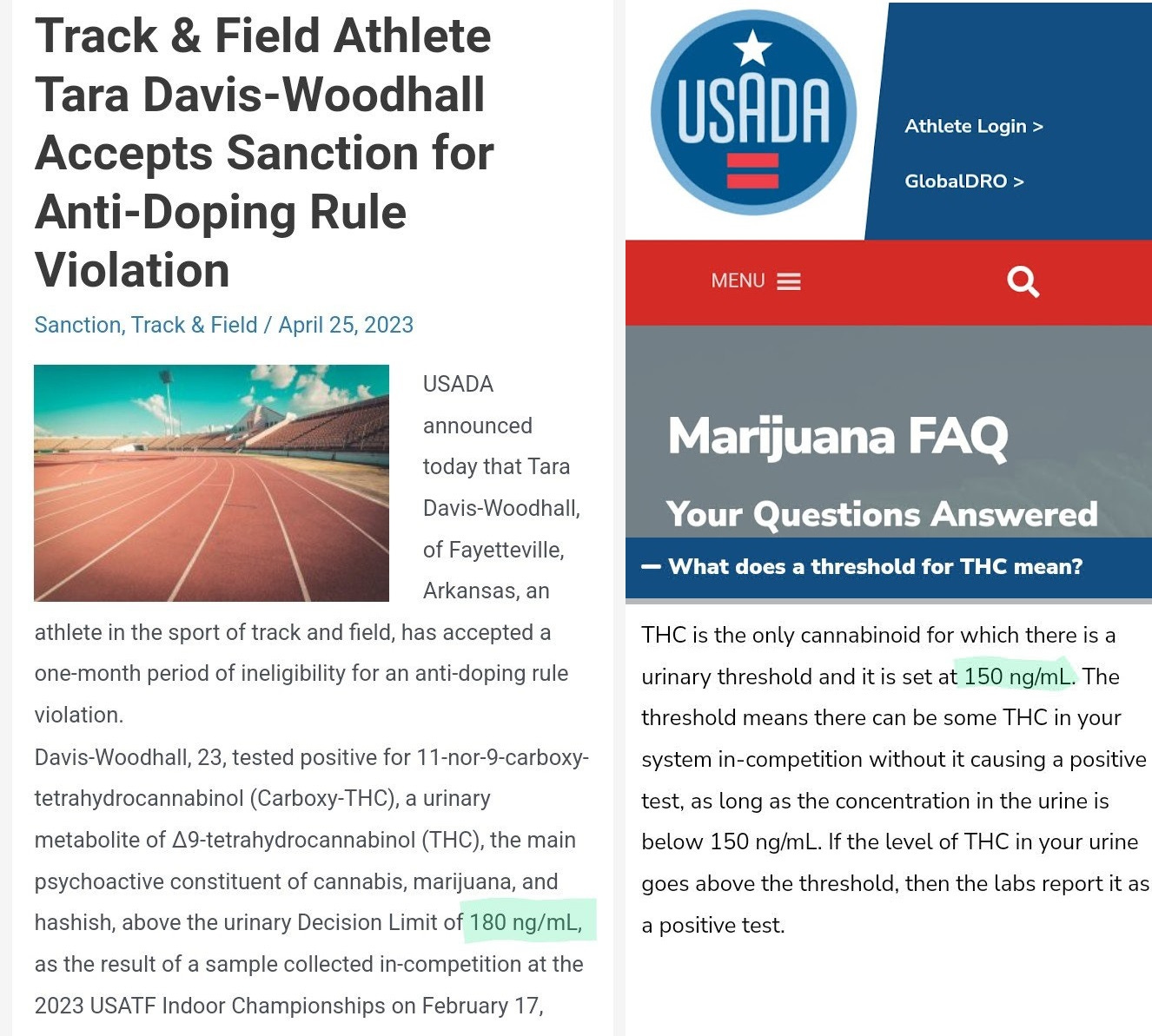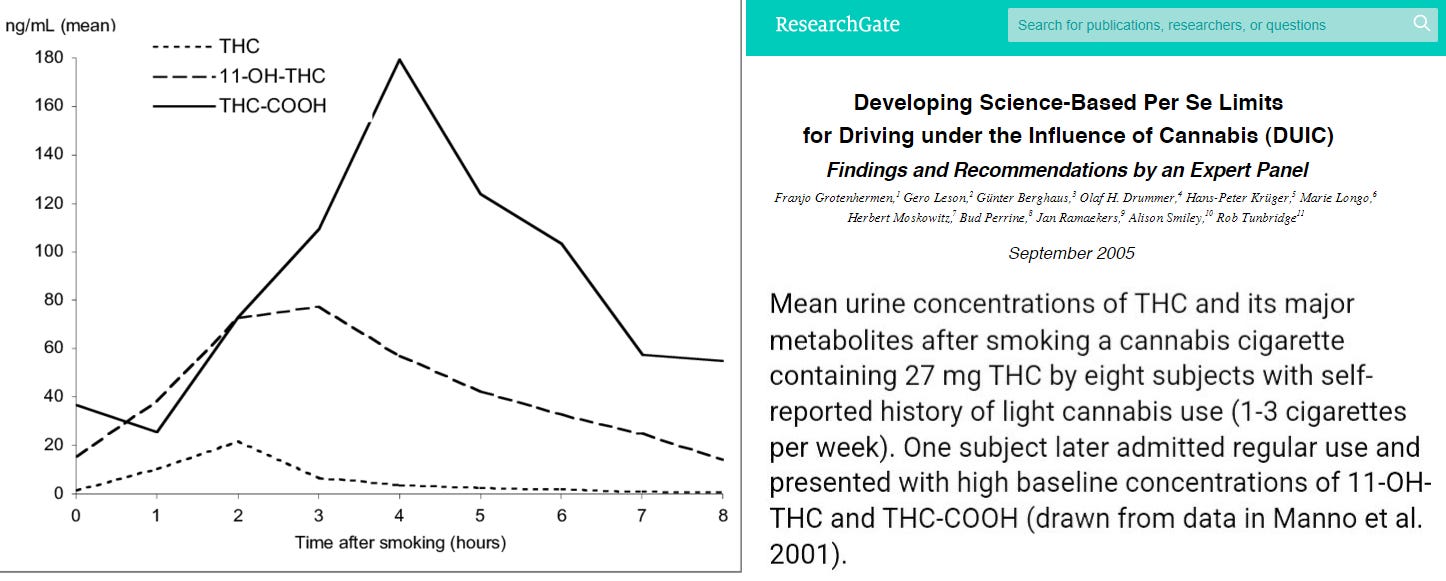Tara Davis-Woodhall sidelined for a month for THC use
As silly as it is to keep this substance prohibited, it's easy enough to be a regular user and avoid being sanctioned
Tara Davis-Woodhall is a 23-year-old American sprinter, hurdler, and long-jumper who stands fifth on the all-time U.S. outdoor long-jump list with a leap of 7.14 meters (23 feet, 5 inches). That jump puts her a quarter of an inch behind the New Hampshire high-school boys’ record-holder, Taylor Smith of Timberlane, who soared 23’ 5.25” twenty-five springs ago.
When Davis-Woodhall—a 2021 Olympian in her primary event in the same year she was both the indoor and outdoor NCAA Division I champion—recorded that mark in March of 2021, she was 21 years old. The four women ahead of her on the U.S. list—Jackie Joyner-Kersee, Marion Jones, Brittney Reese, and Tianna Bartoletta—were 32, 22, 29, and 30 respectively when they set their personal bests, and Jones’ career, and everything else about her, exploded in an unusually sordid doping scandal in 2007. Davis-Woodhall is a versatile athlete with a rosy and potentially long future.
Yesterday, the U.S. Anti-Doping Agency announced that Davis-Woodhall had accepted a one-month suspension after testing positive for metabolites Δ9-tetrahydrocannabinol (delta-9-THC) at the U.S. Indoor Championships in February.
USADA reliably makes apparently mundane athlete suspensions interesting by offering conflicting or dubious information. In the news release, USADA claims that Woodhall-Davis’ urine sample was flagged for THC metabolites being above the permissible limit of 180 nanograms per deciliter (ng/dL). Yet on this page, USADA informs us* that the threshold is almost 17 percent lower—150 ng/dL.
The difference is significant because, as the graph below demonstrates, the higher limit is extremely unlikely to trigger a positive in an infrequent user, and far less likely to capture use even by someone who blazes up regularly.
The graph and the paper that contains it reveal to us something else, and it’s the more important point: We basically have to smoke within a few hours of our urine being collected to jam enough THC metabolites into our pee to trigger what’s considered a positive test, be the limit 180 ng/dL or 150 ng/dL.
Yet from the USADA report on Davis-Woodhall:
Davis-Woodhall’s period of ineligibility was reduced to one month because her use of cannabis occurred out-of-competition and was unrelated to sport performance, and because she successfully completed a substance of abuse treatment program regarding her use of cannabis.
I’m curious how USADA determined that this was out-of-competition use. Maybe Davis-Woodhall smoked before going to the meet or after her event, but it virtually had to be on the same day, within a few hours of peeing in a cup.
USADA basically allows athletes to be potheads as long as they can abstain on the days they compete. I know a lot of recreational pot users, but none who wouldn’t willingly stop for a day given even a little incentive, much less a shot at the Olympics.
At the same time, however, THC really shouldn’t be on the banned-substances list; USADA’s (and to some extent those of WADA, the World Anti-Doping Association) lax policies and almost meaningless penalties herald this admission, and the whole set-up doesn’t strongly discourage anyone from rolling the dice and smoking pot even on the day of a national championship or Olympics or World Championships event.
Now, conspiracy theorists might suggest here that Davis-Woodhall gratefully agreed to the reduced suspension because USADA chose to disclose only some of what its lab rats found in Davis-Woodhall’s February urine sample. They would suggest that the nexus of sports marketing and negotiating justice often works this way. They would probably propose something like, “They busted Sha’Carri Richardson, working with known dope-mongers, for the same thing as a means of distracting from something else. Everyone falls for it.”
Well, they can hate the sport and everyone in it all they like and insist on being Gloomy Guses. We’ve heard it all before.
Missing the next month of racing will inconvenience but not injure Davis-Woodhall’s career. But despite the mild penalty, it’s gloomily entertaining to watch top black American sprinters and jumpers get picked off by USADA for bullshit reasons while the mostly white Bowerman Track Club and other operators are clearly getting away with far more flagrant violations. If I were a paranoid social-justice type, or merely concerned at all, I would take a hard look at that, a far harder one than everyone did at the stuff that happened in Boston last week.


